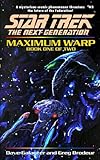My Thoughts
I pre-ordered the digital edition of this book several months ago when it was first announced, so I knew it would be arriving on my Kindle around 2:00 this morning. I was pleasantly surprised when it actually showed up at midnight, because I’m very nocturnal. Translation: by the time I went to bed around 2 AM, I’d read 81% of this novel.
The Light Fantastic is the sequel to Lang’s own Immortal Coil, which, I confess, left me conflicted when I first read it. The adult part of me, the part that is an improviser and a writer, really liked it, though I felt that Data and Rhea’s relationship was both too fast, and not believable (this despite the fact that I liked Rhea as a character). The part of me that was 16 or 17 when TNG premiered on TV and crushed on Data had other issues, but adult-me was able to ignore them.
But then David Mack gave us is Cold Equations trilogy, and those expanded upon Data 2.0’s mindset and choices, and gave us better insight into the Fellowship of AI, and left a door open for more with this beloved character.
And now Lang has wrapped up a truly amazing arc. We get to find out how Data’s been spending the last two years of his life. We get a glimpse into his life with the newly restored Lal, his daughter, who is in the midst of the android equivalent of adolescence, and then she’s abducted – by Moriarty – yes, the hologram – and we’re thrown into a story that is both a mystery and a story about what it means to grow up, grow old, raise children, and explore one’s identity.
Data as a father is both hilarious and heartbreaking – especially as he’s still acclimating to his new body and his permanently engaged emotions.
Lal as a teenager is also hilarious, and frustrating, and it gave me new respect for the way my own mother must’ve felt when I was a teenager myself.
Geordi, of course, is along for the ride, because no Sherlock can be without his Watson, and along the way we are introduced to a few favorite characters from both TNG and TOS.
Overall, The Light Fantastic is a truly satisfying read, and if Data doesn’t sound exactly the way we’re accustomed to him sounding, well, he himself states in the novel that he isn’t entirely certain how much of him is HIM, and how much is leftover Noonian Soong.
The tag, of course, teases a new mystery, and I have no idea if that will pan out, or if the soft canon of the novels will eventually merge with the soft canon of the STO game and the Countdown to Trek 2009 (in which Data was Captain of the Enterprise), but if it doesn’t, I would totally buy a series of intergalactic mysteries featuring Data and LaForge.
Goes well with French-pressed coffee and a chocolate croissant.



